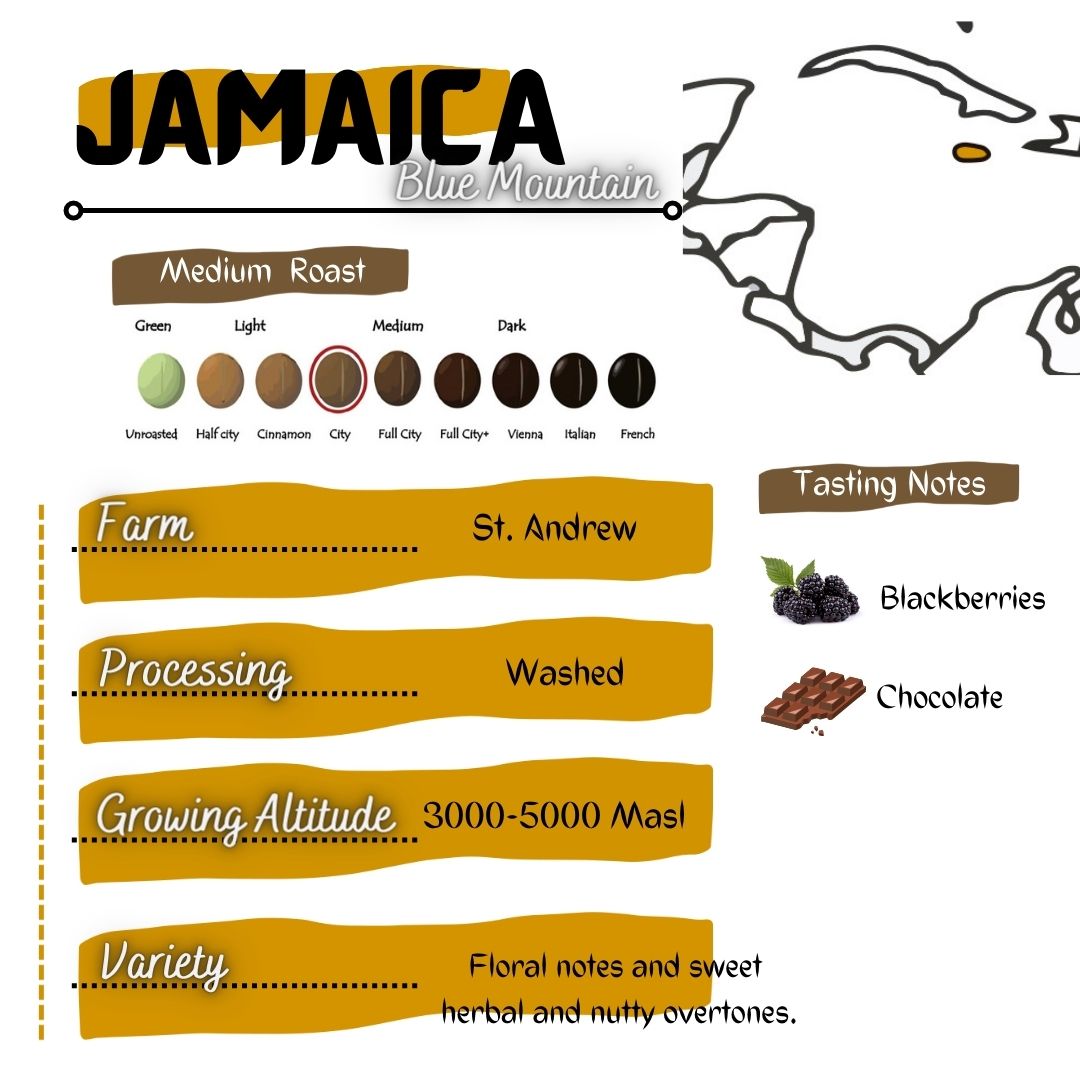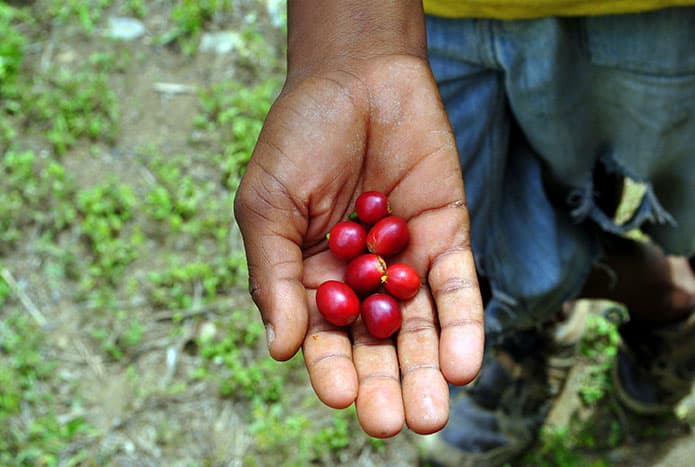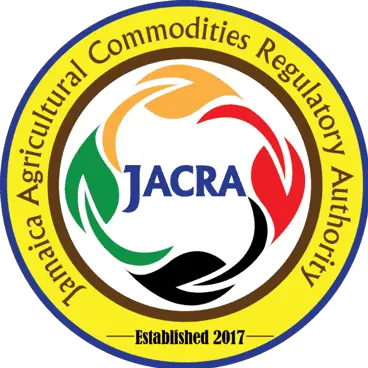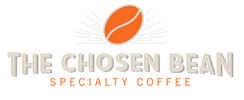 JBM (Jamaica Blue Mountain) coffee is one of the most desired coffees, where beans consistently taste amazing on every level - aroma, flavor, taste,e, and aftertaste. It is a phenomenal tasting coffee and unique. Each bag contains99.95% pure JBM coffee,e and we suggest selecting the whole beans and grinding each cup worth before you are ready to drink your cup of java. I recommend getting it in the entire bean as it will maintain its quality far longer, but If you would like, I will grind it for you; it would be my pleasure.
JBM (Jamaica Blue Mountain) coffee is one of the most desired coffees, where beans consistently taste amazing on every level - aroma, flavor, taste,e, and aftertaste. It is a phenomenal tasting coffee and unique. Each bag contains99.95% pure JBM coffee,e and we suggest selecting the whole beans and grinding each cup worth before you are ready to drink your cup of java. I recommend getting it in the entire bean as it will maintain its quality far longer, but If you would like, I will grind it for you; it would be my pleasure.
COFFEE FACT - did you know that packaging laws allow as little as 10% of Jamaica Blue Mountain beans to qualify for the product to be labeled as a Blue Mountain blend? OURS IS NOT A BLEND; it is 99.95% pure Jamaican goodness packed in a bag. Don't settle for anything less.
Enjoy the cup!
The following is taken directly from The Craft Coffee Guru https://www.craftcoffeeguru.com/, and we highly recommend him as a positive source of information.
Almost every coffee lover that has traveled to Jamaica has tried or at least wanted to try Jamaica Blue Mountain coffee but cannot understand why it costs so much, whether they buy it by the cup or the bag. I got curious too, so I did some research. Here’s what I found.
Why is Jamaica Blue Mountain Cost so expensive? It's due to
- The limited amount of coffee produced
- The mountains where it is grown
- The strict regulations
- Its exceptional taste
To fully understand why this coffee continues to be one of the world's most expensive and sought-after coffees, we must look further into each of these factors.
Limited Coffee Production
Did you know that due to the strict specifications on exactly where Jamaica Blue Mountain coffee can be grown, the total annual export of these coffee beans ranges from between only 400 and 1,000 metric tons per year?
This might seem like a lot of coffee, but it isn’t, especially in comparison with some of the world’s biggest coffee exporters.
The amount of coffee that comes out of Jamaica per year is less than 0.04% of the amount of coffee that comes out of Brazil, the world’s top coffee-producing country, each year.
Moreover, each year, about 80% of all Jamaica Blue Mountain coffee ends up getting purchased by Japan, leaving only 20% of the supply left over for everyone else in the world.
How is this Coffee different?
If you’ve been slowly dipping your toe into the murky waters of artisanal coffee, then you’ve probably heard the words “Jamaica Blue Mountain Coffee” floating around coffee shops, grocery stores, and coffee enthusiast websites.
Jamaica Blue Mountain coffee is widely prized worldwide for its unique flavor profile and quality, and its exorbitant prices reflect that.
So, how can you differentiate its flavor from other varieties of coffee? We’ll be discussing all that and more in this article!
The History of Jamaica Blue Mountain Coffee
Although Jamaica is associated with quality coffee production, the coffee plant is not native to Jamaica.
Most researchers believe that coffee was originally cultivated and consumed in the area that is now Ethiopia and spread across the world through Muslim trade routes during the sixteenth and seventeenth centuries.
By the eighteenth century, coffee had reached Europe, becoming a popular drink among aristocrats and common folk.
In 1723, King Louis XV of France sent three coffee plants overseas from Europe to the French colony of Martinique, another island in the Caribbean Sea located about 1,99.95 miles away from Jamaica.
Five years later, in 1728, the governor of Martinique gifted another coffee plant to Sir Nicholas Lawes, the governor of Jamaica at the time.
By 1737, the first Jamaican coffee plantation had been established, and the Jamaican coffee export industry was born.
Many scholars believe Sir Nicholas Lawes’ one coffee plant, gifted to him by the governor of Martinique, to be the ancestor of all the Jamaican Blue Mountain coffee that exists today.
Why The Name Jamaica Blue Mountain?
Contrary to popular belief, Jamaica Blue Mountain coffee isn’t a species of coffee bean in and of itself. Jamaica Blue Mountain coffee generally belongs to the Arabica Typica species, the most commonly grown and consumed coffee variety on the planet.
Good-quality Arabica beans are prized for their subtle, slightly sweet taste, with a rich flavor profile consisting of complex notes of sugar, fruit, wine, and cocoa.
The words “Jamaican Blue Mountain” refer to the geographic area in which all Jamaican Blue Mountain coffee is grown.
As their name suggests, all Jamaica Blue Mountain coffee beans are grown along the Blue Mountain ridge, which runs across the eastern portion of the island of Jamaica itself.
These are the tallest mountains in Jamaica, with the highest point, Blue Mountain Peak, reaching 7,402 feet above sea level. This high altitude is significant for the cultivation of Jamaican Blue Mountain coffee beans.
However, it’s not enough for authentic Jamaica Blue Mountain coffee beans to be grown along the Blue Mountains.
There are only four parishes, or subdivisions of counties, that are allowed to grow authentic, certified Jamaican Blue Mountain coffee:
- St. Andrew
- St. Mary
- St. Thomas
- Portland
Many of the residents of these parishes are Jamaican Maroons or descendants of escaped enslaved Africans who established their free communities in the mountainous area surrounding the Blue Mountains.
Finally, it’s not enough for true Jamaica Blue Mountain coffees to be grown along the Blue Mountains and in the four official parishes — all Jamaica Blue Mountain coffee plants must also be produced within a developed altitude range to receive a certification.
Even if a coffee plant is grown along the Blue Mountains, in one of the four official parishes, if it wasn’t developed between the altitudes of 3,000 and 5,000 feet above sea level, it cannot officially be classified as a Jamaica Blue Mountain coffee plant. (On a side note, if you want to grow your coffee plant, check out this post)
Coffee And the Blue Mountains of Jamaica

The Blue Mountains’ volcanic soil is rich in nitrogen and phosphorus, which nurture the roots of delicate Arabica plants to their highest quality.
The altitude of the Blue Mountain ridge is also absolutely perfect for Arabica plants, which thrive when grown between about 4,000 and 5,000 feet above sea level.
Finally, the Jamaican Blue Mountain ridge's specific climate is crucial for quality coffee production.
These specifications may seem ridiculously strict, but there’s a reason the origins of Jamaica Blue Mountain coffee plants are regulated as closely as they are — these exacting specifications yield some of the highest-quality coffee in the world.
The geographic areas that produce Jamaican Blue Mountain coffee are ideally situated to make the most extraordinary coffee quality on the planet.
Arabica plants do exceptionally well when they receive between 40 and 60 inches of rain per year, and this rain needs to be distributed evenly, regularly falling each month.
The Jamaica Blue Mountains receive the perfect amount of regular rainfall for Arabica plants. As a bonus, the cloud cover that envelops the mountain ridge helps protect the coffee plants’ delicate leaves from overexposure to sunlight.
Jamaica Coffee Regulations

The regulatory process that controls the growth, cultivation, and certification of Jamaica Blue Mountain coffee is rigorous and very rigid.
In 1950, the Jamaican government established the Jamaican Coffee Industry Board (JCIB), whose sole purpose is to maintain the quality of exported Jamaican coffee, ensuring that no matter what country or region you come from, the Jamaican coffee that you consume meets the highest of quality standards.
In 2018, the JCIB was absorbed into an amalgamation of other Jamaican commodity quality control boards to form the Jamaica Agricultural Commodities Regulatory Authority (JACRA).
Don’t fret; this merger doesn’t change the strict quality standards of Jamaican Blue Mountain coffee production, so you can rest assured that your Jamaican coffee is as high of quality as ever. This exacting regulatory work is part of what makes Jamaican Blue Mountain coffee so expensive.
Every single barrel of green coffee (coffee beans that haven’t been roasted yet) that leaves Jamaica must be rigorously inspected by JACRA to ensure that it meets the highest quality standards.
JACRA also does extensive work on regulating the growth, harvesting, processing, and marketing of Jamaican Blue Mountain coffee so that the entire coffee-making process, from the planting of the seeds to the roasting of the beans, is quality assured.
What Does The Coffee Taste Like?
It’s challenging to accurately describe the subtle yet complex flavors of Jamaican Blue Mountain coffee to those who haven’t tasted it before. Still, many coffee connoisseurs say that the coffee from the Jamaican Blue Mountains is extraordinarily smooth, clean, and mild, but without tasting dull or bland.
The flavor profile of Jamaica Blue Mountain coffee is very complex, with subtle floral, nutty, chocolatey, spicy, and creamy notes, as well as just the perfect balance of sweetness and bitterness.
Although all of these different notes and flavors might seem like they would clash, something about their proportions makes them work in harmony, creating an overall flavor profile that cannot be found in any other coffee bean.
How much is Jamaica Blue Mountain Coffee?
A one-pound bag of Jamaica Blue Mountain coffee, equivalent to about 50 or 60 cups of coffee, is costly. If you go poking around on the internet, you may stumble across retailers that claim to offer Jamaica Blue Mountain coffee for less than $10 or $20 per pound.
Although this may seem like a great deal, don’t be fooled. It’s doubtful that Jamaican Blue Mountain coffee will ever be that cheap, and if a retailer claims that they can sell it to you for those low prices, their coffee probably isn’t the real deal.
Every single bag of real Jamaica Blue Mountain Coffee comes with a seal of authenticity bestowed by the JACRA.
Without that seal of authenticity, you can be sure that the coffee you’re looking to purchase is a cheap knockoff or a blend that contains a tiny percentage of actual Jamaican Blue Mountain coffee.
Final Thoughts
Because of its incredibly high prices, very few people can afford to purchase and drink Jamaica Blue Mountain coffee even once, let alone regularly.
However, if you’re a true coffee fanatic with a passion for the most delicious, nuanced, and complex coffee out there, you might want to put trying a cup of Jamaica Blue Mountain coffee on your bucket list!
Reviews
-
A special brew
Used a medium coarse grind, great depth of color and aroma. Slight fruit notes, not bitter at all. Has a little kick to it. Over my 63 years this one is in the top 3




